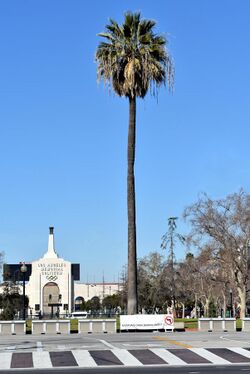Biology:Oldest palm tree in Los Angeles
The oldest[1] palm tree in Los Angeles is in Exposition Park, where it has survived for more than a century following its transplanting on September 5, 1914.[2] It may be the most-often-moved palm in the city.[3]
The Washingtonia filifera fan palm now on Exposition Park Drive just off Figueroa Street sits at the West 39th Street [ ⚑ ] 34°00′51″N 118°17′00″W / 34.014041°N 118.283257°W intersection.
History
It started life in the suburban wilds until it was uprooted and moved, probably to San Pedro Street between 2nd and 3rd streets in the 1850s.[4]
It was chosen in 1889 to be moved to a featured spot in front of the entrance to Arcade Depot, the Los Angeles station for the Southern Pacific Railroad, situated on Alameda Street between 4th and 5th Streets.[5] As one historian recalls, "It made the city’s first impression on tourists and transplants disembarking at the station, a sign that they had reached the promised land of sunshine after a long journey west."[6]
A quarter of a century later, newspapers were describing the Arcade Depot as "ancient" and "unsightly and inadequate",[7] so Southern Pacific moved its operations to Central Station in 1914 and the Arcade Depot was history. The tree some called the "Arcade Palm" found a new home in Exposition Park.
Since Exposition Park (known as Agricultural Park until it was renamed in 1913)[8] was not complete in 1914, and the construction of the Los Angeles Memorial Coliseum was yet to come, it is uncertain whether the tree was moved to its present location in 1914, or whether it spent time elsewhere in the Park.[9] Whatever its exact journey, despite a "dent" a little more than halfway up its trunk, perhaps due to the 1947-1950 drought or some other environmental assault, the tree - now 100 feet tall[6] - has flourished over three centuries and remains healthy.
See also
References
- ↑ Lila M. Higgins and Gregory B. Pauly, with Jason G. Goldman and Charles Hood (Natural History Museums of Los Angeles County) (2019). Wild LA: Explore the Amazing Nature in and Around Los Angeles. Portland OR: Timber Press. p. 192. ISBN 978-1604697100.
- ↑ Text on commemorative plaque, illustration
- ↑ Fred Gray (2018). Palm. London: Reaktion Books Ltd. ISBN 978-1780239170.
- ↑ D.J. Waldie (10 May 2013). "Remembering What's Always Been Here: The Oldest Palm" (in en-US). https://www.kcet.org/socal-focus/remembering-whats-always-been-here-the-oldest-palm.
- ↑ Holly Charmain Kane (2007). Arriving in Los Angeles: Railroad Depots as Gateways to the California Dream. unpublished Master's thesis, University of Southern California School of Architecture.
- ↑ 6.0 6.1 Nathan Masters (17 April 2013). "CityDig: L.A.'s Oldest Palm Tree" (in en-US). Los Angeles Magazine. https://www.lamag.com/citythinkblog/citydig-las-oldest-palm-tree///.
- ↑ Nathan Masters (January 17, 2013). "Lost Train Depots of Los Angeles History". Socal Focus. KCET. http://www.kcet.org/updaily/socal_focus/history/la-as-subject/lost-train-depots-of-los-angeles.html. Retrieved 2019-03-02.
- ↑ Charles P. Hobbs (2014). Hidden History of Transportation in Los Angeles. Charleston SC: The History Press. ISBN 978-1626196711.
- ↑ "SkyscraperPage Forum - View Single Post - noirish Los Angeles". http://forum.skyscraperpage.com/showpost.php?p=6127986&postcount=14612.
 |





